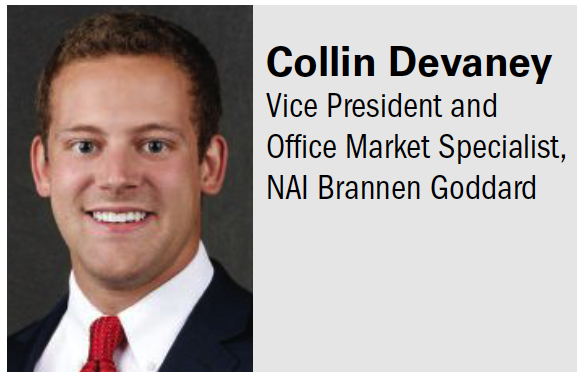
Austin Brannen and Matt Bentley to Lease LogistiCenter at Miller Road for Dermody Properties
October 21, 2020
Stephen Pond Completes Industrial Sale-Leaseback in Franklin, Georgia
January 11, 2021Collin Devaney: Atlanta’s Office Market is going to be just fine

Microsoft executed a 523,000-square-foot office lease in May at Atlantic Yards, an office development within Atlantic Station in Atlanta. The software giant plans to invest $75 million as the sole tenant at the building, which is owned by Hines and Invesco.

ATLANTA’S OFFICE MARKET IS GOING TO BE JUST FINE AS NEW DEVELOPMENTS COME ON LINE
By Claire Blevins, marketing coordinator, and Collin Devaney, vice president and office market specialist at NAI Brannen Goddard
We’ve all seen the depressing commercial real estate news stories about the state of the office market, with words like “bleak,” “hazy” or “obsolete” in the headlines. Questions surround every major market, including Atlanta — a metro market known for its dependable economy and robust demand.
Admittedly, Atlanta has had its struggles during the pandemic, like slow leasing activity and rising rental rates, but not everything is doom and gloom. New City Properties, in the middle of breaking ground on Mailchimp’s new headquarters, announced it was upping the budget to prepare for future pandemics, including setting money aside for technology that is not even available yet.
Other developers are choosing to prioritize private green space over expensive machinery. Midtown’s new Norfolk Southern headquarters, opening by the third quarter of 2021, takes advantage of its 3.4-acre lot by developing a campus-style hub filled with parks and a rooftop garden. Employees who utilize these outdoor spaces decrease the risk of airborne transmissions, as well as promote healthy habits.
Not every office building has room for large outdoor forums, so other owners are doing away with cubicles and building out private offices. Or if they have cubes, they’re advised to choose bigger areas with higher walls and make them more spaced out.
Companies are prioritizing the health of their employees by requiring temperature checks and masks, as well as offering the option to telework. Employers are looking for these precautions and more in the office spaces they’re choosing. For example, tenants are now asking their landlords and property managers about the type of filtration systems their office buildings have. Land-lords will undoubtedly have to update air quality to meet future tenant demands.
Some tenants are choosing to skip the office altogether, opting to save money by sending all their employees to work from home. Business-World reported the percentage contribution of remote jobs has increased by 400 percent compared to last year as a result of the pandemic. Some Atlanta companies like The Home Depot, Coca-Cola, and Southern Co. have chosen to telework indefinitely.
However, the teleworking trend may not last forever as some employees are craving a return to their office environments. People need face-to-face interaction, and companies could suffer greatly by not having their employees meeting in person.
Many economists and real estate professionals say that company culture, which is a key element to recruiting talent and encouraging longevity, cannot be fostered at home. A social environment has shown to lead to better performance in employees, thus working from home trend leads to less productivity and less company capital.
However, the companies choosing to work from home are opening more opportunities for subletting. CoStar reports a 53 percent increase in Atlanta’s available sublet space compared to 2019, which is pretty reactionary to the uncertainty of the pandemic. We expect the market to eventually return to its healthy standard.
Developers seem hopeful in the market’s recovery as well, as construction continues on for major office and mixed-use projects like Atlantic Yards, a 523,500-square-foot development in Atlantic Station expected to deliver in December; Midtown Union, where investment management firm Invesco has claimed nearly 50 percent of the 600,000 square feet of office space; and 1105 West Peachtree Street, a $530 million mixed-use project where Google is eyeing over half of the 675,000 square feet for its Atlanta offices.
Metro Atlanta has nearly 6.4 million square feet of office property under construction and is expanding at one of the fastest rates in the country, according to CoStar. This is only part of the draw to Atlanta for large technology companies like Microsoft and Facebook that have leased offices in the city, including the low cost of living, pedestrian improvements, and MARTA rail expansions.
A recent office report from CoStar stated, “Many employers have openly stated that moving all or a portion of their operations to Atlanta saved them millions, without having to sacrifice access to high-quality labor.”
Companies already in large sub-markets like Midtown or Buckhead can benefit even more by venturing to Atlanta’s suburban submarkets, which are often the most popular location. The Cumberland/Galleria submarket in northwest Atlanta has especially seen a surge in leasing in recent years, in addition to the Alpharetta/North Fulton and Central Perimeter submarkets, which have always been popular with small- to mid-sized technology companies.
In suburban markets, office buildings and parks offer cheaper rent, free parking, and a better perception of personal safety.
No matter where tenants choose to go in Atlanta, there are no bad options. Draws like the quality of life, warm weather, steady economy, expansive airport, and high-quality talent are what is bringing thousands of new high-paying jobs to the market over the next few years. With a strong professional and business services sector, there is no need for disheartening headlines here — Atlanta’s office market is going to be just fine.
Published in REBusinessOnline.com
